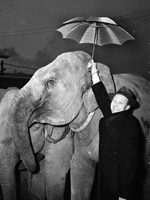Library of Congress: Webcasts

This video archive assembles Library of Congress webcasts in one easily accessible location. The biography and history section offers 159 webcasts of talks by historians, writers, commentators, and political figures, including historians Joseph J. Ellis, John Hope Franklin, Jill Lepore, Lawrence W. Levine, David McCullough, and Robin Shields and writers and commentators David Brooks and Andrea Mitchell. The wide variety of subjects discussed include Vietnam, Iraq, Abraham Lincoln, early American printers and the Declaration of Independence, Pearl Harbor, the national character, early African American life, Lyndon Johnson, and Franklin D. Roosevelt.
The section on government has 67 webcasts by current and former government officials, such as Senator Kay Bailey Hutchinson, George Shultz, and David Weinberger. Subjects include intellectual freedom, global democratic governance, and guardianship and the First Amendment. Moreover, the site offers 56 webcasts on culture and the performing arts and 305 webcasts on poetry and literature. There are also sections on religion, science and technology, and education. This website is a useful resource for information on historical subjects from the historians and authors who have written about them.


